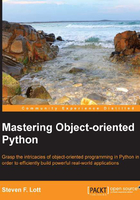
Complete composite object initialization
Ideally, the __init__() initializer method will create a complete instance of an object. This is a bit more complex when creating a complete instance of a container that contains an internal collection of other objects. It'll be helpful if we can build this composite in a single step.
It's common to have both a method to incrementally accrete items as well as the initializer special method that can load all of the items in one step.
For example, we might have a class such as the following code snippet:
class Hand2:
def __init__( self, dealer_card, *cards ):
self.dealer_card= dealer_card
self.cards = list(cards)
def hard_total(self ):
return sum(c.hard for c in self.cards)
def soft_total(self ):
return sum(c.soft for c in self.cards)
This initialization sets all of the instance variables in a single step. The other methods are simply copies of the previous class definition. We can build a Hand2 object in two ways. This first example loads one card at a time into a Hand2 object:
d = Deck() P = Hand2( d.pop() ) p.cards.append( d.pop() ) p.cards.append( d.pop() )
This second example uses the *cards parameter to load a sequence of Cards class in a single step:
d = Deck() h = Hand2( d.pop(), d.pop(), d.pop() )
For unit testing, it's often helpful to build a composite object in a single statement in this way. More importantly, some of the serialization techniques from the next part will benefit from a way of building a composite object in a single, simple evaluation.